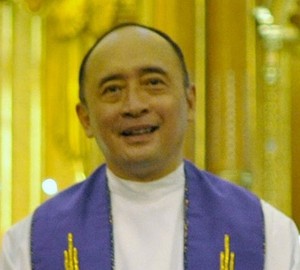‘Don’t just round up street dwellers’
ROUNDING up mendicants and street dwellers ahead of the International Eucharistic Congress (IEC) is a “shortsighted and superficial” response, said Fr. Carmelo Diola.
Diola, who heads the IEC Solidarity and Communion committee, said he did not favor any government plan to gather street dwellers to keep them out of public view.
In a statement sent to media outlets, Fr. Carmelo Diola said the government should instead collaborate with the Church for “organized charity work” to find lasting solutions to the problem.
“The DSWD (Department of Social Welfare and Development) protocol to ‘rescue’ street children and families during the IEC by putting them in certain areas may have some value in it but this, ultimately, is shortsighted and superficial. It also caters to a compliance-only mentality,” the priest said.
Ester Concha, head of Cebu City’s Department of Social Welfare Services (DSWS), earlier said they are “reaching out” to street dwellers out of concern for their safety and plan to build a halfway house in barangay Lorega where services can be extended such as feeding and facilitating their return to their hometowns.
The program is a year-round effort, not just for the IEC, she said.
But Diola said rounding up street dwellers in time for an international event does not solve the problem.
“Why not come together with the Church for organized charity? Reaching out to the poor is no walk in the park. It is no quick fix. But we have to start somewhere. We begin with solidarity,” he said.
The Solidarity and Communion Committee is preparing 500 street and very poor children for First Communion on Jan. 30, a Saturday, at the Abellana National School grounds. The IEC is set to draw 15,000 delegates to Cebu City from Jan. 24 to 31.
Even before the IEC, Diola said a network composed of eight parishes and 14 groups meet weekly to reach out to the poor, including feeding of children.
“We are seeing beautiful changes. In at least three groups of about 100 children, for instance, most children have gone back to school,” he said.
Also, Diola said they introduced a parish-poor survey so that the parish team can identify the poor, pinpoint their location and discern their needs.
He said the survey serves as basis for an Archdiocesan-wide corporal and spiritual works of mercy to be implemented during the IEC.
“This also serves as an opportunity to meet the poor face to face. Several parishes had silently reached out to the poor in an organized manner. We can do something. There is hope,” he said.
Diola said the Church involves barangay officials who gather children while catechists teach them the fundamentals of the Catholic faith.
“Government must create a more welcoming space for local communities to get involved in outreach to the poor,” he said.
He said the Church seeks the dignified participation of the poor during the congress. Indigents will be given meals a day before the start of the congress in an encounter called the “Table of Hope,” a joint effort of the Archdioceses of Cebu and Vancouver.
Disclaimer: The comments uploaded on this site do not necessarily represent or reflect the views of management and owner of Cebudailynews. We reserve the right to exclude comments that we deem to be inconsistent with our editorial standards.

